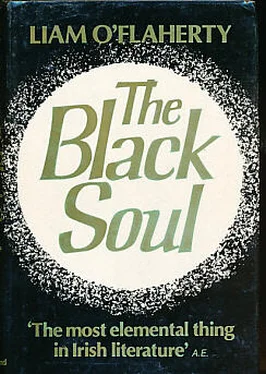Then they became slightly maudlin. The Stranger felt that he was enjoying himself as he had never done before. He kept laughing boisterously for no reason in the world. He felt sure that he would live happily for ever in Inverara in this society. Suddenly death appeared to him to be a menace that he must avoid.
‘Hey,’ he hiccupped, leaning over to O’Daly, ‘what do you think of the next world?’
O’Daly made a noise again like a man urging on a horse.
‘Look here,’ he said, ‘it’s only the young that can afford to waste their time thinking of the next world. As far as I know, this world is too short and it’s seldom Carmody offers us free brandy. Drink to life and damn the next world. Let’s have a song before we go.’
Hot and foolish with drink they began to sing some ridiculous thing out of tune. Before the first verse was finished, each was singing a different song. Then Carmody suddenly dropped his head on the table and fell asleep. O’Daly shook him and tried to wake him. Carmody raised his head and stuttered:
‘Come in here every evening … talk about Karl Marx.’ Then he dropped asleep again.
‘Hell to my soul,’ said O’Daly, ‘who is this fellow Marx he’s always talking about? Must owe him some money. Tight-fisted fellows, these publicans, between the two of us. Come on up to my house and let him sleep.’
The two of them got into O’Daly’s jaunting car that was waiting in the yard. The hardy mountain pony, careless of the freezing mist, had been contentedly chewing bad hay there for two or three hours. They drove up through the village at a walking pace. O’Daly explained that he had been into Kilmurrage to attend a meeting of the local court.
‘This new Government made me a magistrate,’ he shouted. Then he began again to denounce everybody, and the cruelty of bad fortune that had pursued him and his family for generations. He lashed the mare furiously as he spoke, but the mare’s hide was obviously as tough as his own, and she never changed her gait. ‘I have to live up here in a little cottage with my daughter and an old woman who looks after the place. She’s even too old to sleep with. And my daughter has to teach these brats in the school for a living. Everybody has to work for a living nowadays. The world is changed. So it is. I remember in my time … Begob, my daughter is a poor specimen of a woman compared to her mother. In my time they were as wild as the men, strong, hefty women. Ah well’ … And he went on to tell stories of his youth, and of the glory of his ancestors, stories which were for the most part lies, for the days when the O’Dalys of Lisamuc were people of importance were too distant to be remembered by anybody.
The cold mist was scattering the exhilarating effect of the brandy from the Stranger’s mind. He began to be melancholic and dissatisfied again. He grew jealous of O’Daly’s strength, of his coolness and strong nerves.
‘Ah,’ he said to himself, ‘he has no intellect. That’s what it is.’ And he cursed God for having given himself a strong intellect until he remembered that there was no God and became still more depressed because he had nobody to blame for his sorrow. Then, in order to ease the pent-up volume of his sadness, he began to tell O’Daly his troubles, but O’Daly paid no attention to him. He continually interrupted with his own reminiscences.
‘You’re a young man,’ he would say, ‘and you don’t understand the world. Now, in my time, the young men feared nothing. Not even the devil in hell. Is it that measly war you’re talking about? Sure that was only a cockfight compared to what I’ve seen in my young days.’
They reached O’Daly’s cottage. The Stranger, irritated because O’Daly would not pity him, wanted to go home immediately, but O’Daly would have none of it. He stood in the middle of the road, one hand holding the reins, the other hand grasping the Stranger’s shoulder.
‘See that house of mine,’ he shouted at the top of his voice. ‘There’s a hovel for an O’Daly to live in! Hell to my soul, but the world is gone to the dogs. Listen to me’ – he panted loudly and wheezed –‘listen to me. The O’Malleys used to live here in the old days. And now where are they? Gone to hell. Gone and forgotten. There isn’t a trace of them. The last of them, devil take him, he had queer notions in his head, I hear; ran away to America with a slip of a flighty woman. And there you are. Wait there till I put the mare in the stable.’
The Stranger stood leaning against the gate leading up to the cottage. He became ashamed of having been fond of life an hour before. He felt as a monk might feel after being seduced by a woman. Blackness gathered again around his soul. ‘I made a fool of myself,’ he muttered.
The mist seemed to stick like icicles to his cheekbones. He wanted to run away, but he hadn’t the energy to make up his mind to do anything. His stomach became as hard as a ball. It robbed him of all energy. Weakness crept through the extremities of his hands and feet. Then O’Daly came along breathing loudly. The Stranger felt that he could kill the man for his very power to breathe so loudly.
‘Come on in,’ said O’Daly gruffly. ‘Make as little noise as ye can,’ he added. ‘I don’t want to wake Kathleen. The poor girl has to go to that damn school in the morning. The shame and disgrace of it is killing me.’
They crept on tiptoe up the path and into the kitchen by the back door. O’Daly was staggering a little. He lit a candle and placed it on a table in the centre of the room. Then he got a bottle from somewhere and two empty cups without handles. They set to drinking again. O’Daly became maudlin, crying about the fallen fortunes of his family. The Stranger suddenly became afraid, afraid of O’Daly, afraid of the dark kitchen with the dim flickering candle standing in the centre of it like a warning of death, afraid of the dark silent night outside, with the sound of the sea coming from a distance. He drank hurriedly, but the drink seemed to evaporate impotently in his throat. It tasted like water. Strange shadows began to gather before his eyes. He started at every sound. He couldn’t see O’Daly, but he could hear his quavering voice. The sea rolling on to the beach at Coillnamhan reminded him of the ‘keene’ women at wakes over dead bodies. It was as if one heard a pot boiling a million miles away. And to the south against the cliffs it sounded like a great weight falling swiftly into a deep cavern. Then he jumped to his feet as he heard O’Daly snore.
He listened for a full minute, breathing gently, perfectly motionless. In that minute he felt that he was a pure soul being judged by wicked demons. Then his mouth gaped as the picture of the night he was buried by a shell in France flashed before his mind. A cormorant called dismally passing over the house. He listened to the swishing wings. Then his right knee began to tremble. His left foot began to tap the ground. He bent down carefully to hold it steady.
‘Hold on there,’ he muttered, trying to laugh.
Then his whole body trembled. Beads of cold sweat poured out through his forehead and neck. With an oath he shot out his hands and made for the door. He felt sure that he would be dead before he reached the open air. The round ball in his stomach was stifling him.
The night air revived him. He laughed at his fears. He straightened himself when he got into the road and said, ‘Pooh, I’m all right.’ But at that moment the wind rose suddenly. A squall came from the south over the crags. It came with a swoop. He gasped and his eyeballs started. As he ran headlong forward, fantastic visions crowded into his mind. He saw millions of dying men, worlds falling to pieces, continents being hurled into the air, while he himself wandered among the chaos, the only living atom in the wrecked universe. He ran faster, trying to escape the vision, but they pursued him, crowding on one another, cries of the wounded, shrieks of the damned, corpses piled mountain-high, races wandering across deserts, chasms opening everywhere, devils grinning, wild animals with gory jaws rushing hither and thither in dark forests, myriads of men talking in strange languages, gesticulating, shouting furiously, the wails of women, the bodies of children transfixed on spears. Over all came the noise of the guns, millions of guns, rising and falling and intermingling. Their sound was like a millrace. It made beautiful music that enthralled him and made him want to kill. Then the music died and dread spectres returned. They were bare grinning skulls now and fetid smells. His body was rising into space and flying away, headed for the moon. But there was a great weight tied to the stomach that held it back. His brain began to expand. It covered the earth and then the universe, and then it burst, hurting his forehead.
Читать дальше












